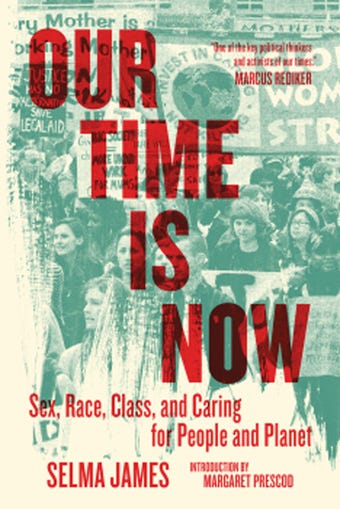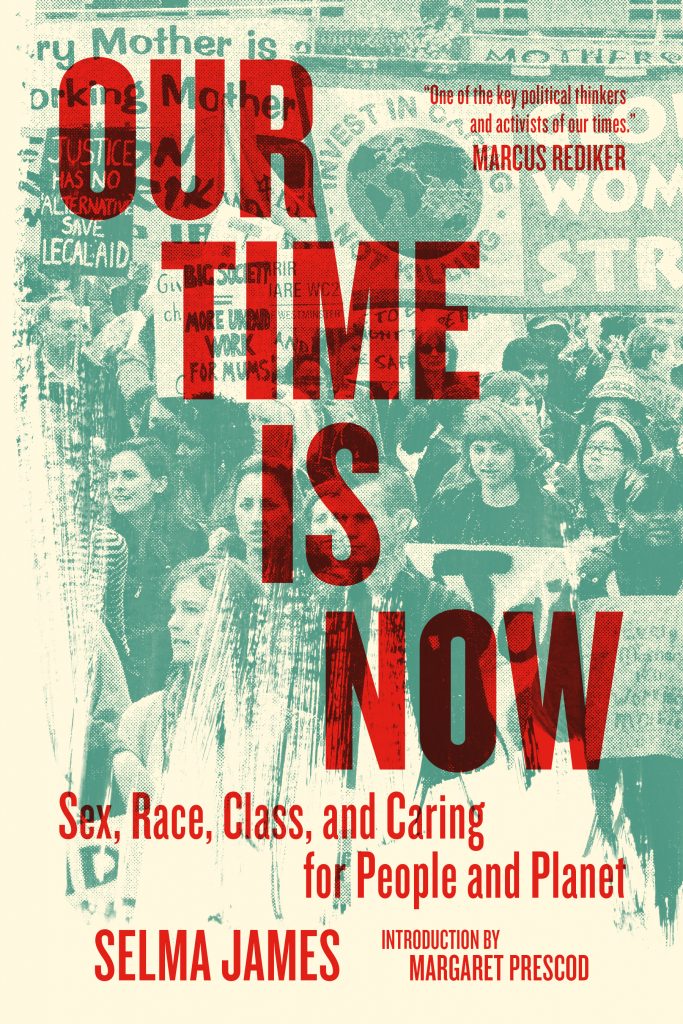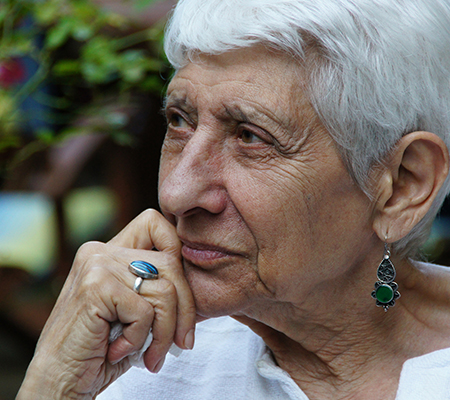By Gabrielle Dixon
Refinery29
August 22nd, 2021
At 91, Selma James has been an activist for longer than I’ve been alive, times three. A Jewish woman born in New York, in 1952 she published her first book, A Woman’s Place, aged just 22 – a radical piece of work underlining the frustrations of women’s lives in the home and the significance of their unwaged labour as housewives and mothers. Her new book, Our Time Is Now: Sex, Race, Class, and Caring for People and Planet, immortalises her greatest hits throughout her illustrious career and is packed with riveting speeches and interviews.
In her 75 years of activism, Selma has worked with the English Collective of Prostitutes, Wages for Housework and Time Off campaigns, the movement for West Indian independence, the UK’s Campaign Against Racial Discrimination, the Black Regional Action Movement and the International Jewish Anti-Zionist Network – and that’s to name a few.
Her new book is full of moreishly readable and eye-opening snippets from a storied career of fighting for every woman’s rights.
Here are eight lessons from 75 years of activism to take into your own life…
Demand respect
Women have been deserving of respect for much longer than we’ve been asking for it. The year was 1985 and Selma’s Wages for Housework campaign wanted to do something big, something worldwide. They called it the Time Off campaign and it had women from England to Switzerland and Egypt taking the day off so that people could see exactly what they were missing out on when women stopped working. From farmers’ wives to stay-at-home mums, the world moves a lot slower when unwaged women stop working for free. Though the strikes don’t take place anymore, Selma wrote in 2020: “Especially since the Covid-19 virus hit, it is undeniable that waged and unwaged carers are front line, and that we rely on them for survival.” Women still work harder, longer and for less money. Demand better for yourself, because women are overdue it.
Champion others
Women supporting women is as simple as that. Wages for Housework called itself the pro-money coalition because it was pro paying all women for all work. And all women really did mean all, because the Wages for Housework campaign included everyone from disabled women to women of colour, lesbian women to sex workers. It was having the back of the women around her – women who didn’t necessarily have the same day-to-day problems – that made her cause stronger.
Raising voices opens minds
Hearing a different perspective is all it takes to change someone’s outlook forever. If it’s hard being a sex worker now, minds were even more closed back in the ’70s and ’80s. Catholic women in Wages for Housework were not wild about working with – in their words – lesbians and sex workers. But that view came from ignorance, and probably misunderstanding; when they began to work with each other, their views began to shift. Your views and opinions are the most powerful thing you have, and you might totally change someone’s outlook just by having the confidence to speak up.
Recognising mistakes is what helps us grow
They say that insanity is doing the same thing over and over again and expecting a different result. It’s no secret that feminism in its early days was too preoccupied with breaking the glass ceiling, meaning it totally excluded the likes of disabled women, sex workers, queer people and people of colour. But Wages for Housework had a small army of women who had often been left behind, because they made the simple effort to include them. It’s pretty obvious now but it’s a mistake that was made for too long. Listening to people around you is literally the easiest thing in the world, and it’s 2021. Inclusive campaigns are well overdue by now.
We’re more powerful together
There’s strength in numbers and if there’s enough of you, well, they can’t ignore you all. Margaret Prescod of Black Women for Wages for Housework was a major player in the US fight. When the US finally introduced financial aid for families with children, it was Margaret on the receiving end of most of the credit from Wages for Housework. She’d been running most of the groups across the States for years.The stories in this book are incredible but Selma makes one thing clear: she fought alongside an international band of fighters who deserve the same credit as her. Mutual respect might seem simple but it’s been a force for change in the ordinary and extraordinary: home, office and world order.
Find the people who support and challenge you
In the golden age of Tinder it seems like the options are endless but there is a way to know if someone is the right choice. Selma and her late husband, C.L.R. James, were an activist power couple. By the time he died in 1989, James was a well-known force in Black academic studies. He supported Selma from the beginning, pushing her to write her first book before they’d even begun dating. After getting married, the two of them moved to Trinidad where they took part in anti-colonial activism and despite divorcing in 1980, Selma still dedicates time to exploring his work, like the essays in this book. They were two people with big ideas and a bigger impact. It’s love and respect like this that we should all expect from our partners.
Standing up and making noise has always worked
Last year was the year of protests, from Black Lives Matter protests across the country to the #MeToo vigil for Sarah Everard on Clapham Common. Practical activism is a tried and tested method for change. Selma even noticed how the organising for the Time Off campaign itself made women’s work visible. From opening the Crossroads Women’s Centre in London’s Kentish Town to her work with innumerable campaigns for justice, Selma proves that change comes from the steps you are unafraid to make.
Acknowledging your power is just the start

Selma’s work is still relevant today because she embraced everything about the powerful women around her, recognising that “there is no separate struggle of gender, of race, of nationality, of social and immigration status. They are autonomous parts of the same movement.” The campaigns she worked with were for women who decided they “shouldn’t have to cut off any part of our identity to fit into any movement”. There is power in acknowledging the complexities of all our circumstances and the hard work we put into just living our lives. This awareness is just the beginning:”It’s time now, today, that we begin to acknowledge that we are every woman, each of us, carrying the burdens of the world, two-thirds of the world’s work, and that in the course of acknowledging that burden and making governments acknowledge that burden, we are in the process of lifting that burden, finally, once and for all, off our shoulders.”







